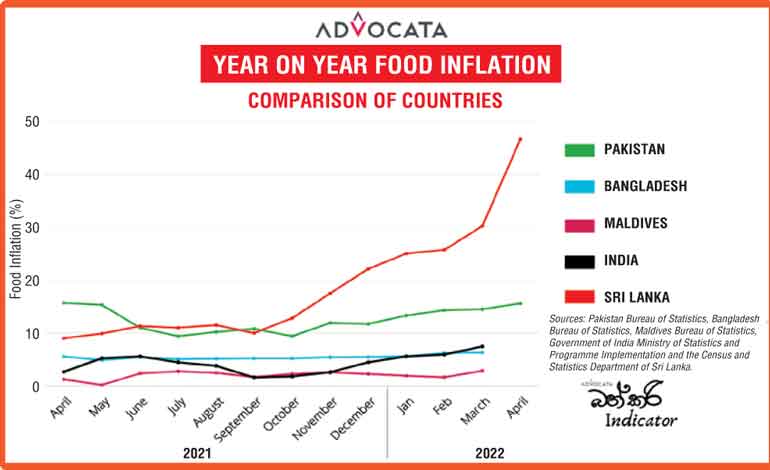Monday Feb 16, 2026
Monday Feb 16, 2026
Friday, 6 May 2022 00:20 - - {{hitsCtrl.values.hits}}

Advocata’s Bath Curry Indicator (BCI), which tracks the monthly changes in the retail price of food, recorded an increase of 14% from March to April. This is a year on year increase of 49% for this basket of food.
The independent policy think tank said this is driven primarily by prices of dhal and samba rice being the highest recorded by the BCI. A kilo of Dhal in April 2021 was Rs. 178, a year later it cost Rs. 466. A kilo of samba in April 2021 was close to Rs. 130, a year later this cost Rs. 210. With food prices increasing at this rate, a family of four to spend on the BCI basket of food would have to pay approximately Rs. 560 or more for a week.
The Colombo consumer price index recorded a similar rate of 47% year on year increase in food inflation. Comparing supermarket food prices from March 2021 to 2022 there has been an increase of close to 40%.
“This drastic increase in food prices in 2022 is a result of macroeconomic instability within the country. Although global prices have increased due to the pandemic and issues with supply chains, global prices have not increased as fast as the prices in Sri Lanka,” Advocata said.
It said in Sri Lanka in addition to the global pandemic related issues, we are currently facing shortages of foreign currency which impacts local supply chains.
This impact has also been exacerbated by consistent import restrictions, both causing shortages. These shortages compounded by the fact that the value of the currency has been falling steeply have all contributed to food prices rising faster and faster in 2022.
The BCI tracks the weekly retail prices in the Colombo market of the most commonly consumed food ingredients that might be used in a typical bath curry meal. The prices are collected from the “Weekly Indicators” that the Central Bank publishes. The BCI Indicator can be accessed at www.bci.advocata.org.